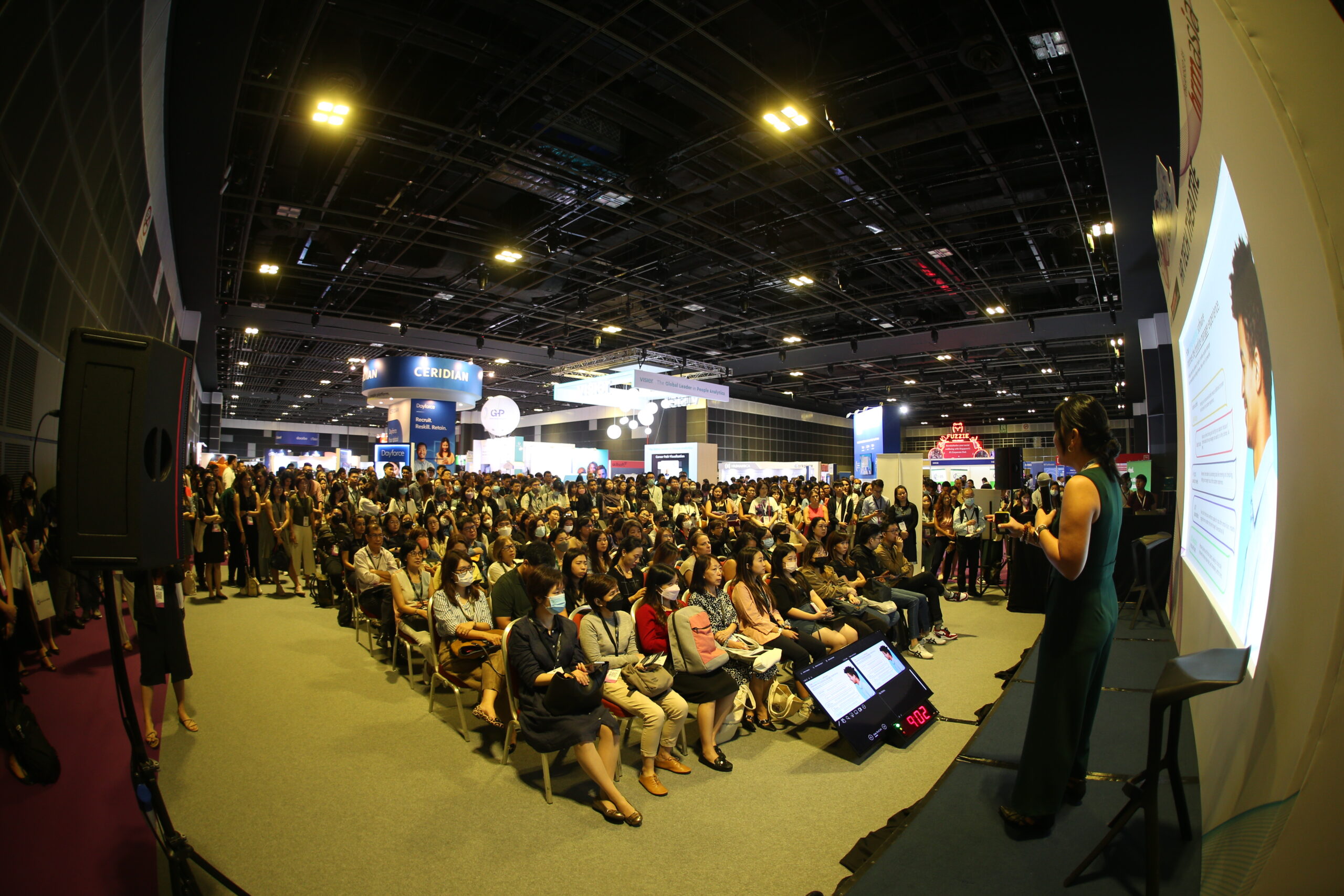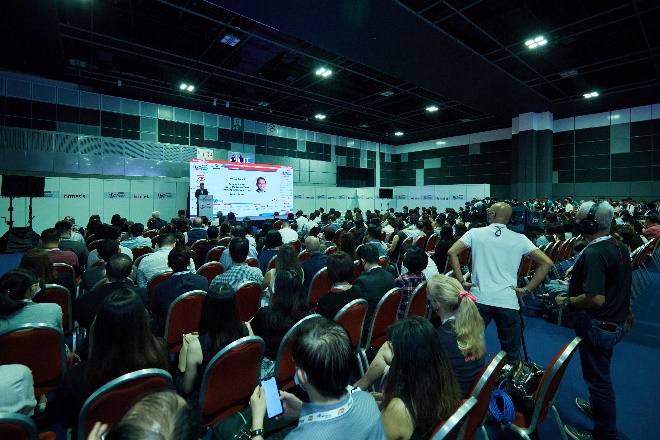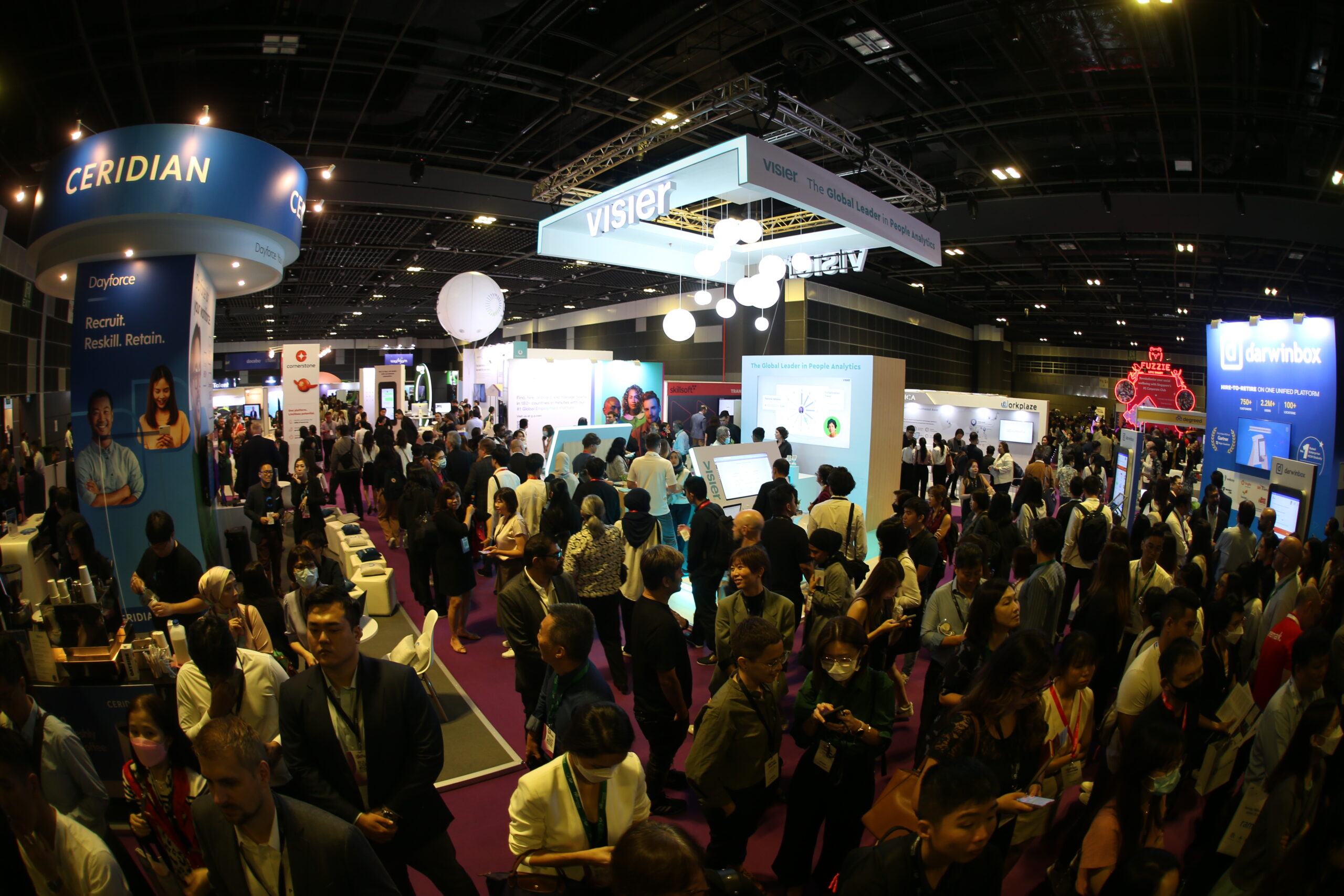HR Tech Festival Asia 2023: Career flexibility and tech take centre stage

HR Tech Festival Asia 2023 headed into its Day 2 with an even more impressive line-up of speakers, such as Rob Squires, VP, Regional Head of Asia and Japan, Ceridian, who discussed the importance of career flexibility. Drawing from Ceridian’s 2023 Pulse of Talent report, Squires highlighted the untapped opportunity for increasing employee retention and organisational resilience.
He suggested that organisations could empower their employees to find exciting internal career moves through a phenomenon that Gartner calls ‘quiet hiring’, and explained, “When you replace the career ladder with personalised and flexible career paths, employees have a variety of experiences and development opportunities without having to leave the organisation. Quiet hiring doubly benefits organisations because they can source and build the skills needed to move fast and stay ahead of the curve, even in a competitive labour market.”
At the Engage Theatre, Martin Laschkolnig, the Founder and CEO of the Institute for the Development of Potential, gave an opening keynote. He touched on issues that are affecting the world today, and how those issues would change the way we view work, life, and human resources as a whole. Amidst the talk, he discussed and shared practical strategies and mindset changes to help individuals deal with the daily stressors that could affect personal and professional lives. This included asking teams to acknowledge the situation they are in, and work on bringing in empathy, trust, and security into the discussion along with a few solutions that can help the individual and HR teams keep calm and help each other during difficult situations.
As organisations strive to navigate the challenges of competitive labour pools, HR and talent acquisition leaders are seeking ways to position themselves as revenue drivers. In a session by Eleanor Vajzovic, Global Head of Strategic Solutions, Paradox, she pointed out how automating repetitive hiring tasks can transform organisations and create better experiences for everyone involved.
A case study on Paradox’s work with McDonald’s illustrated the transformative potential of automating hiring tasks. The Olivia solution, which was implemented as an end-to-end hiring solution in 18,000 McDonald’s restaurants in the US, Canada, and UK, automated over 90% of the hiring process, including application, Q&A, scheduling, offer, and onboarding. The process was simplified for restaurant managers, saving 4-5 hours of manual work each week.
As a result, candidates can now apply for a McDonald’s job in just three minutes or less through text or chat. The hiring experience is mobile-first, and almost 100% of candidates report satisfaction with their application experience, she shared. Time to hire has also been reduced to less than two days in some restaurants.
Andrew Myers, Managing Director, APAC, WorkJam, showcased strategies and skills, bringing forth the issues that organisations with frontline employees would face. In his speech, Myers discussed the points where organisations sometimes lose out on their best and brightest, with case studies and examples that could see productivity rise, along with employee retention and digital transformation. He also took time to showcase the work that WorkJam is pushing for with their Digital Frontline Workplace, bringing mobile human capital management (HCM) to the frontlines of organisations to become the best and most efficient versions of themselves.
Optimal organisation structures, roles, and responsibilities are critical for achieving superior performance in any organisation. At a panel discussion, Farhan Mohmood, Associate Client Partner, Korn Ferry Digital, moderated a conversation with Shwu Ping Kee, Head of Talent and Learning, Prudential; and Sanjay Ray, HR Director of Total Rewards, Essentra. The speakers shared their insights on hiring the right talent and developing strategies for rewarding and motivating employees to advance their careers. By understanding the right talent to hire and creating a supportive environment, organisations can build a strong foundation for their workforce.
The single biggest trend impacting the future of work is remote and globally distributed teams, and it is here to stay, declared Christopher McNamara, Chief Revenue Officer, Remote. He drew upon the insights and expertise from Remote’s 2023 Global Workforce Report to provide strategies and solutions for HR leaders to navigate tough economic times and take advantage of international employment opportunities.
He emphasised that distributed remote work is a long-term strategy that makes organisations more competitive and employees more productive. Despite challenges and economic uncertainty, the freedom and flexibility of remote work remain key for employee satisfaction. Moreover, employers can take advantage of unexplored remote talent hubs, avoiding saturated hiring markets and unlocking new opportunities for growth.
Nicole Lim, Talent Transformation Architect, IBM Consulting, discussed AI and IBM’s hand in helping create the accelerated modern workplace. In her talk, Lim took time to guide interested audience members through what IBM has been doing with AI and even got to discuss newer AI programmes like watsonx, touted as the future of AI for business.
Tim Sackett, President, HRU Technical Resources, discussed how people’s roles in a world that is rapidly changing in the face of the AI landscape. He discussed how work has transformed from labour-intensive jobs to creator-based jobs, and how the rise of AI will lead to narrator-style roles, where employees can dictate, order, and narrate the way jobs and tasks would be done.
The future of work, explained Sackett, is one where people must work together with AI to succeed, and doing so can actually create more jobs rather than lose them, citing examples in the past where the introduction of machines put a few jobs out of existence, but in effect created more jobs that would be available for aspiring employees. Calling generative AI a co-pilot, he added that while AI can be a beneficial tool, the technology at the moment is similar to “an overconfident child”, explaining that it still needs guidance, that which needs human intervention.
Day 2 of HR Tech Festival Asia 2023 also featured the ASEAN Human Development Organisation (AHDO) Human Development Summit, which hosted a panel discussion focusing on how human development (HD) is replacing the traditional HR model and how organisations can establish a balance between economic priorities and HD. The panel, moderated by Farid Basir, Chief People Officer of MBSB Bank Berhad, featured Elisa Mallis, Managing Director of Asia Pacific at the Center for Creative Leadership; Federico Donato, President, Eurocham Singapore; and Welyne Jeffrey Jehom, Researcher and Senior Lecturer in the Department of Anthropology and Sociology, Universiti Malaya. The panellists shared their opinions on business leaders not being fully prepared to lead a new generation of employees but emphasised that this is not necessarily due to any fault of their own.
“In the last decade, we seem to be moving from one emergency to another,” mused Donato. Mallis shared her opinion that trust has plummeted in institutions and organisations in the last few years, calling it a “crisis in leadership.” In her view, organisations must find a way to move from resilience to an emphasis on wellbeing, which must come with optimism and belief in possibilities. When asked how leaders can work to shift their development in a post-pandemic and unpredictable world, Jehom cited the need for solid education and learning, while the other two panellists called for a re-establishing of collaboration and trust in more substantial ways in different organisations.
READ: HR Tech Festival Asia 2023: HR transformation in the future of work
In a fireside chat between David Lovell, Director, Marketing – APAC, Skillsoft, and Sam Chia, Executive Coach, Skillsoft, the duo discussed how important coaching is to transformative leadership. “What makes a transformative leader?” Chia asked. “It’s really about helping people look at the new future.”
During their chat, they discussed just how beneficial coaching is not just for the individual leader but also for their team. “A good executive coach works together with leaders as partners, and challenges them to look beyond their own thought process and thinking,” explained Chia. Rather than counsellors or advice givers, a good executive coach helps leaders develop self-awareness and emotional intelligence that helps leaders develop skills to lead transformative change. The chat worked between both men to discuss the importance of building a coaching culture within organisations.
The role of the CHRO in addressing the twin challenges of sustainability and staff retention, motivation, and performance was the focus of a workshop on at HR Tech Festival Asia 2023. Led by Joanne Flinn, Author of Greensight, the Sustainability Guide for Company Directors and Chairwoman, The ESG Institute, the CHRO Exclusive Workshop provided exclusive data from the State of Sustainability Survey and helped attendees understand their Sustainability Readiness Profile.
Flinn emphasised the importance of environmental, social, and governance (ESG) skills and capacities for organisations to access funds and become more competitive. By demonstrating their ESG capabilities, organisations can have access to capital markets, which is particularly valuable for start-ups.
As we look ahead to the future, more organisations in Asia Pacific are expecting to continue facing talent attraction and retention challenges in 2023. In the closing panel discussion, moderated by Alvin Goh, Executive Director, Singapore Human Resources Institute, panellists shared their insights and experiences on talent management. The panellists included Low Peck Kem, CHRO & Advisor (Workforce Development) of Public Service Division, Prime Minister’s Office, Singapore; Carolyn Chin-Parry, Digital Innovation Leader, PwC Singapore; and Steven Businovski, Organisational Development & Learning, BHP.
Commenting on building a workforce for the future, Low pointed out three areas that HR leaders need to focus on for the future of work. She said, “The first area is the future of work, where we need to consider how work will evolve with technologies such as AI and how we can redesign work accordingly. The second area is the future of the workforce, where we need to identify and acquire the necessary skills to stay competitive. Finally, the future of the workplace, which includes hybrid work arrangements and the kind of workforce we want to cultivate. HR leaders must focus on building a hybrid work culture and defining the kind of workplace culture required for this organisation.”
And with that, HR Tech Festival Asia 2023 drew to a successful conclusion. HRM Asia would like to extend our appreciation to all the speakers, attendees, sponsors and partners for their support and participation, making this event a resounding success. Looking ahead, we are excited to announce that HR Tech Festival Asia 2024 is already in the works, and we look forward to welcoming you again for another informative and engaging event.



